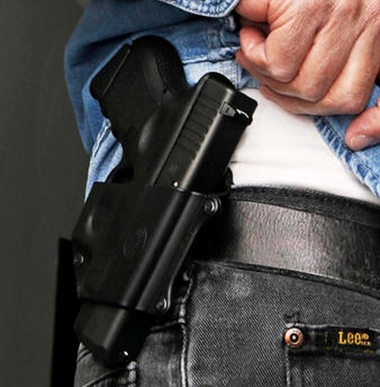Ruling on concealed weapons keeps applications on hold

San Francisco (AP) — Thousands of California gun enthusiasts hoping to legally carry concealed weapons for personal protection were dealt a setback when a federal appeals court upheld a state law requiring applicants to show a good reason beyond simple safety.
The 9th U.S. Circuit Court of Appeals ruled Thursday that Americans don't have a constitutional right to carry concealed guns in public and that California law enforcement officials can require applicants to show "good cause" such as routinely carrying large amounts of money before granting permits.
That ruling undid a previous 2014 ruling of the same court that tossed out the restrictions and prompted thousands of Californians to flood sheriff's departments with concealed weapons applications seeking the permits for personal safety.
The San Diego sheriff received some 2,463 applications that didn't show "good cause" and placed them on hold while the court sorted out the issue.
Robert Faigan, a lawyer for the San Diego sheriff, said those applications won't be granted unless the U.S. Supreme Court overturns the ruling Thursday.
Other sheriff departments had similar policies while still others like the Orange County Sheriff's Department did issue permits under the looser, 2014 ruling. Orange County Sheriff Sandra Hutchens told the National Rifle Association that some 1,700 permits were issued under the looser standard. Those permit holders will be asked to show good cause when they renew their permits in four years if the ruling stands, the sheriff said.
"Those of us that want to carry concealed, we're the good guys. We go through an incredible amount of background checks," said Timothy Smith, an Anaheim, California gun dealer. "I've already been checked so many times. So we're the good guys."
By a vote of 7-4, the court upheld a California law that says applicants must cite a "good cause" to obtain a concealed-carry permit. Typically, people who are being stalked or threatened, celebrities who fear for their safety, and those who routinely carry large amounts of cash or other valuables are granted permits.
"We hold that the Second Amendment does not preserve or protect a right of a member of the general public to carry concealed firearms in public," Circuit Judge William A. Fletcher wrote for the majority.
The ruling overturned a 2014 decision by a three-judge panel of the same court that said applicants need only express a desire for personal safety.
In a dissent, Circuit Judge Consuelo M. Callahan said the ruling "obliterates the Second Amendment's right to bear a firearm in some manner in public for self-defense."
Three other federal appeals courts have ruled similarly in the past, upholding California-like restrictions in New York, Maryland and New Jersey. In addition, another federal appeals court struck down Illinois' complete ban on carrying concealed weapons.
The 9th Circuit covers nine Western states, but California and Hawaii are the only ones in which the ruling will have any practical effect. The others do not require permit applicants to cite a "good cause." Anyone in those states with a clean record and no history of mental illness can get a permit.
The National Rifle Association called the ruling "out of touch."
"This decision will leave good people defenseless, as it completely ignores the fact that law-abiding Californians who reside in counties with hostile sheriffs will now have no means to carry a firearm outside the home for personal protection," said NRA legislative chief Chris W. Cox.
Gun control advocates and others hailed the ruling.
"This is a significant victory for public safety and for local jurisdictions that apply sensible policies to protect the public," said California Sen. Dianne Feinstein, a Democrat.
The California case began in 2009, when Edward Peruta filed a legal challenge over the San Diego County sheriff's refusal to issue him a permit. Peruta said at the time he wanted a weapon to protect himself, but the sheriff said he needed a better reason, such as that his occupation exposes him to robbery.
Peruta, who is a videographer known for legally challenging local government restrictions, said he is neither a hunter, collector or target shooter but challenged the law because he believed it violated the Constitution. The NRA joined him in fighting the law.
By Paul Elias, Associated Press. Copyright 2016 The Associated Press. All rights reserved. This material may not be published, broadcast, rewritten or redistributed.
The Gayly – June 10, 2016 @ 8:25 a.m.





